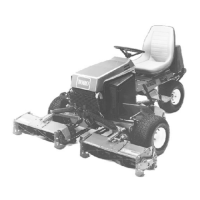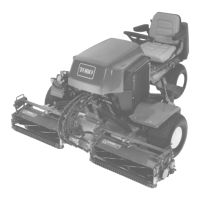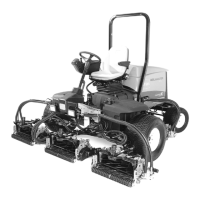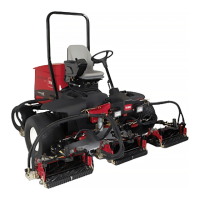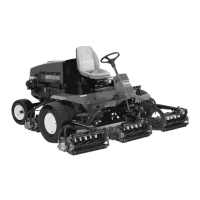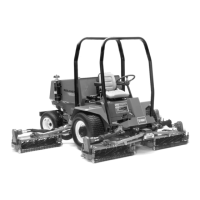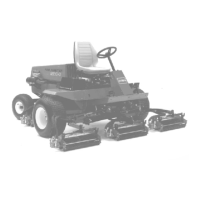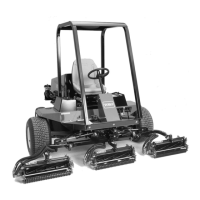Do you have a question about the Toro Reelmaster 2000-D 03431 and is the answer not in the manual?
Details safety standards and the importance of following safety instructions for operational safety.
Outlines essential safety guidelines for operating the machine, covering general practices.
Emphasizes the necessity of thorough operator training and familiarization with controls and safety.
Covers pre-operation checks, fuel safety, and accessory evaluation before use.
Details safe operating procedures, including slope operation, stopping, and hazard avoidance.
Provides crucial operating tips like avoiding confined spaces, using proper lighting, and general safety.
Lists essential checks and procedures for maintaining the machine and storing it properly.
Highlights specific safety warnings and practices pertinent to Toro riding mowers.
Details safe practices when operating on slopes and near various hazards.
Focuses on hydraulic system checks, fuel lines, and safety during maintenance activities.
Details the guaranteed sound power, sound pressure, and vibration levels of the unit.
Lists and explains various safety and instruction decals on the machine for user guidance.
Explains specific hazards related to explosion, caustic liquid, fire, and poison indicated by decals.
Lists essential daily and periodic checks for the machine for quick reference.
Provides fluid types, capacities, and recommended change intervals for maintenance.
Details the starting and stopping instructions as shown on the machine's decal.
Identifies and explains the function of major controls on the operator's control panel.
Explains the operator's manual decal and associated control functions for clarity.
Further explains the operation of various controls as depicted on the decal.
Provides detailed technical specifications for the machine's components and overall design.
Lists physical measurements and weights of the machine and its various configurations.
Lists available optional equipment for the machine and their corresponding model numbers.
Lists all parts required for assembly and details their specific uses.
Details the correct placement of various decals for European compliance requirements.
Step-by-step instructions for mounting the rear wheel assembly onto the machine.
Guide for adjusting the rear carrier frame height to ensure proper operation.
Instructions for attaching carrier frames to the cutting units according to specifications.
Details securing mounting links to carrier frames using capscrews and nuts.
Step-by-step guide for installing the front lift arm assemblies onto the machine.
Instructions for mounting the drive motors to the cutting units correctly.
Procedures for mounting the cutting units onto the machine's frame.
Guide for installing and setting counterbalance springs for 27-inch cutting units.
Explains how spring tension affects weight distribution and machine traction.
Instructions for installing and tensioning springs for 32-inch cutting units.
Details the process of adjusting spring tension using shackles and pins for optimal performance.
Chart to determine required ballast kits based on cutting unit configuration for stability.
Steps for filling, activating, and safely charging the machine's battery.
Guides on correctly connecting positive and negative battery cables, including safety warnings.
Procedure for checking the engine oil level and adding oil if it is low.
Safe procedures for filling the diesel fuel tank, including precautions.
Steps to check the coolant level and clean radiator/oil cooler for optimal performance.
How to check the hydraulic fluid level and recommended fluids for the system.
Specifies the correct tire pressure required for optimal machine performance.
Procedure for checking reel to bedknife contact to ensure quality of cut.
Instructions for torquing wheel nuts to ensure safety and proper function.
Explains the functions of the traction and stopping pedal for machine movement.
Details the operation of the starter switch for starting and stopping the engine.
How to adjust engine speed using the throttle control for optimal operation.
Explains how to raise and lower the cutting units for transport and operation.
How to engage and disengage the cutting unit drive using the switch.
Explains the function of the hour meter and various indicator lights on the panel.
How to engage the parking brake for safety and security.
How to adjust reel speed and engage backlapping for reel maintenance.
Step-by-step guide for starting the engine, including precautions.
Instructions for bleeding air from the fuel system when necessary.
Procedures to verify the proper operation of safety interlock switches.
Guidelines for safely towing the machine in emergency situations.
Advice on operating the machine for optimal performance and safety on various terrains.
How to adjust reel speed based on height of cut and turf conditions.
Table for selecting reel speed for 5-blade reels based on height of cut.
Table for selecting reel speed for 8-blade reels based on height of cut.
Recommends practicing machine operations before regular use for confidence.
Steps for inspecting the mowing area and determining the best mowing direction.
Guidelines for safely transporting the machine between different work areas.
Procedures for washing, cleaning, and inspecting the machine after mowing operations.
Explains the SCM's role, inputs, outputs, and LED indicators.
Logical steps to troubleshoot issues related to the Standard Control Module.
Details input/output requirements for specific product functions.
Instructions for troubleshooting based on LED status and circuit conditions.
A schedule outlining maintenance tasks and their recommended intervals.
A checklist for daily inspection items to ensure proper machine function.
Section for recording inspection details and any identified concerns.
Visual aid for locating service points and maintenance components.
Details fluid types, capacities, and recommended change intervals for maintenance.
Identifies lubrication points and frequency for bearings and bushings.
Steps for inspecting and servicing the air cleaner filter and body.
Instructions on how to safely remove and reinstall the machine's hood for maintenance access.
Procedures for cleaning the radiator screen, radiator, and oil cooler.
Interval and procedure for changing engine oil and filter.
Schedule and steps for changing hydraulic fluid and filter.
Explains the purpose and location of hydraulic system test ports for diagnosis.
Instructions for inspecting fuel lines and maintaining the fuel filter/water separator.
Steps for bleeding air from the fuel injectors when the engine won't start.
How to adjust the traction cam to ensure the neutral position is correctly set.
Procedure to adjust the neutral switch for proper operation.
How to check and adjust hydraulic pump and alternator belt tensions.
How to adjust the traction pedal linkage for proper forward traction speed.
Procedure for adjusting the traction pedal damper for smooth operation.
How to adjust the hand brake for proper and equal engagement.
Guidelines for maintaining battery electrolyte level and keeping the battery clean.
How to properly store the battery for extended periods to maintain charge.
Identifies the location and ratings of electrical fuses on the machine.
Step-by-step guide for performing backlapping for reel sharpening and maintenance.
Information on adjustments during backlapping and additional resources.
A diagram illustrating the machine's electrical system components and wiring.
A diagram illustrating the machine's hydraulic system components and fluid flow.
Explains the purpose of the evaporative emission control warranty for the equipment.
Details the warranty coverage for specific evaporative emission-related parts.
Outlines owner's responsibilities for maintaining emission warranty coverage.
Specifies the conditions and products covered by the limited warranty.
How to contact Toro for warranty service and support.
Lists items and conditions excluded from the express warranty coverage.
| Brand | Toro |
|---|---|
| Model | Reelmaster 2000-D 03431 |
| Category | Lawn Mower |
| Language | English |

